人教版(2019)必修第一册 学案Unit1 Teenage life易混易错点辨析学案(有答案)
文档属性
| 名称 | 人教版(2019)必修第一册 学案Unit1 Teenage life易混易错点辨析学案(有答案) | 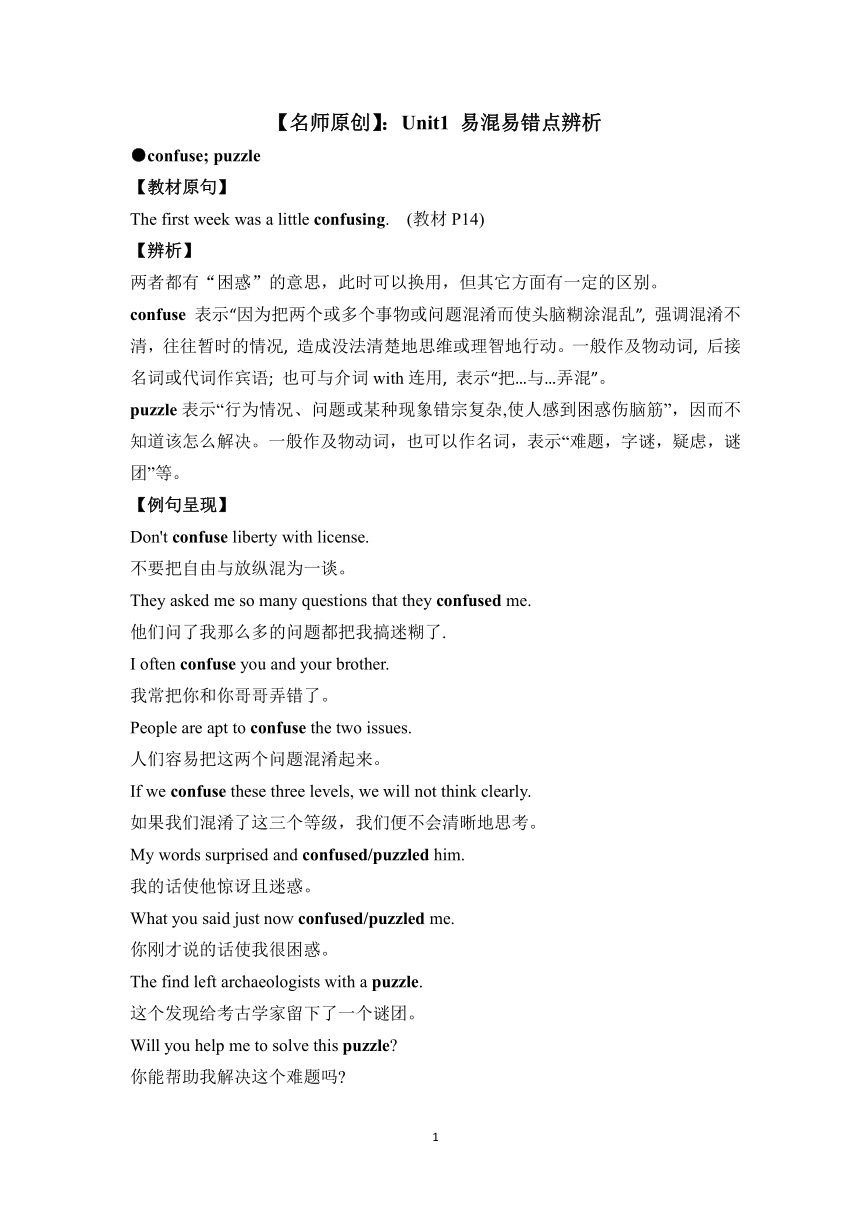 | |
| 格式 | docx | ||
| 文件大小 | 35.3KB | ||
| 资源类型 | 教案 | ||
| 版本资源 | 人教版(2019) | ||
| 科目 | 英语 | ||
| 更新时间 | 2023-03-08 13:27:23 | ||
图片预览

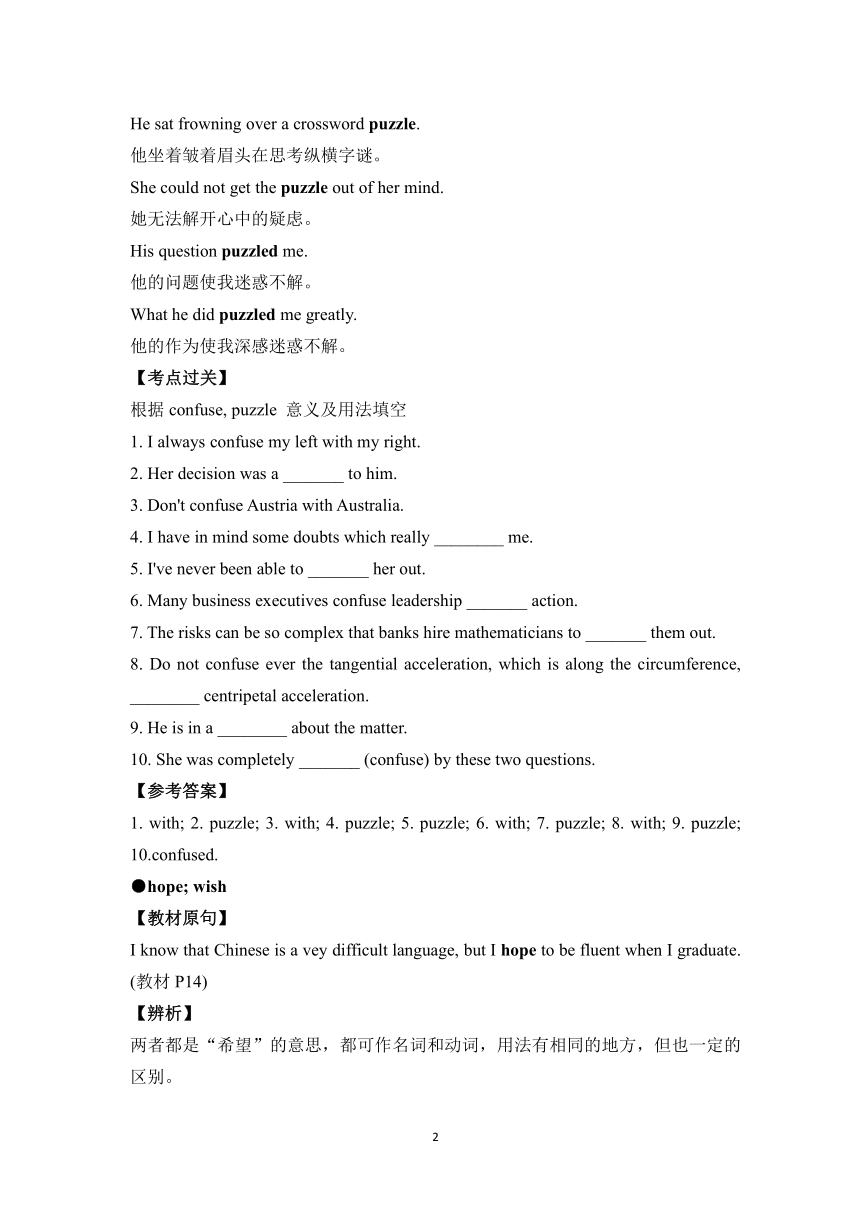
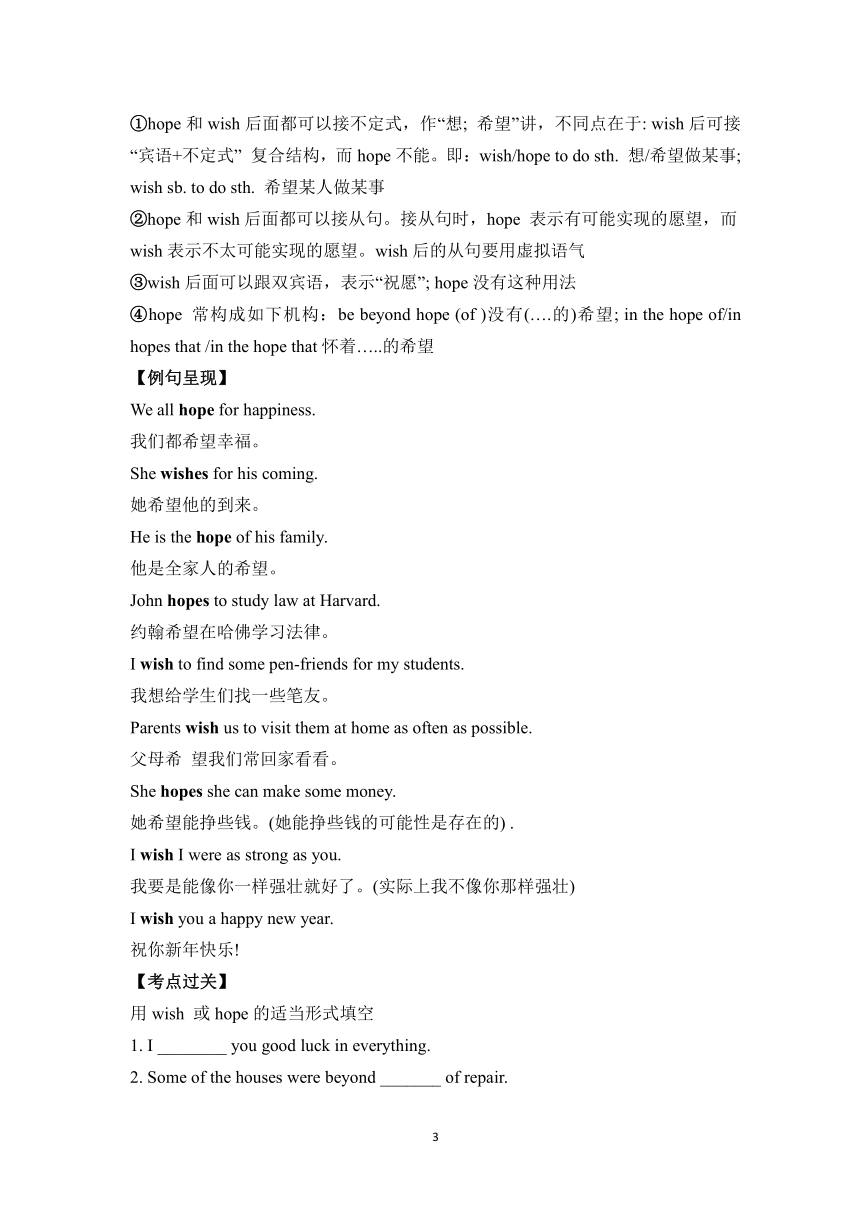
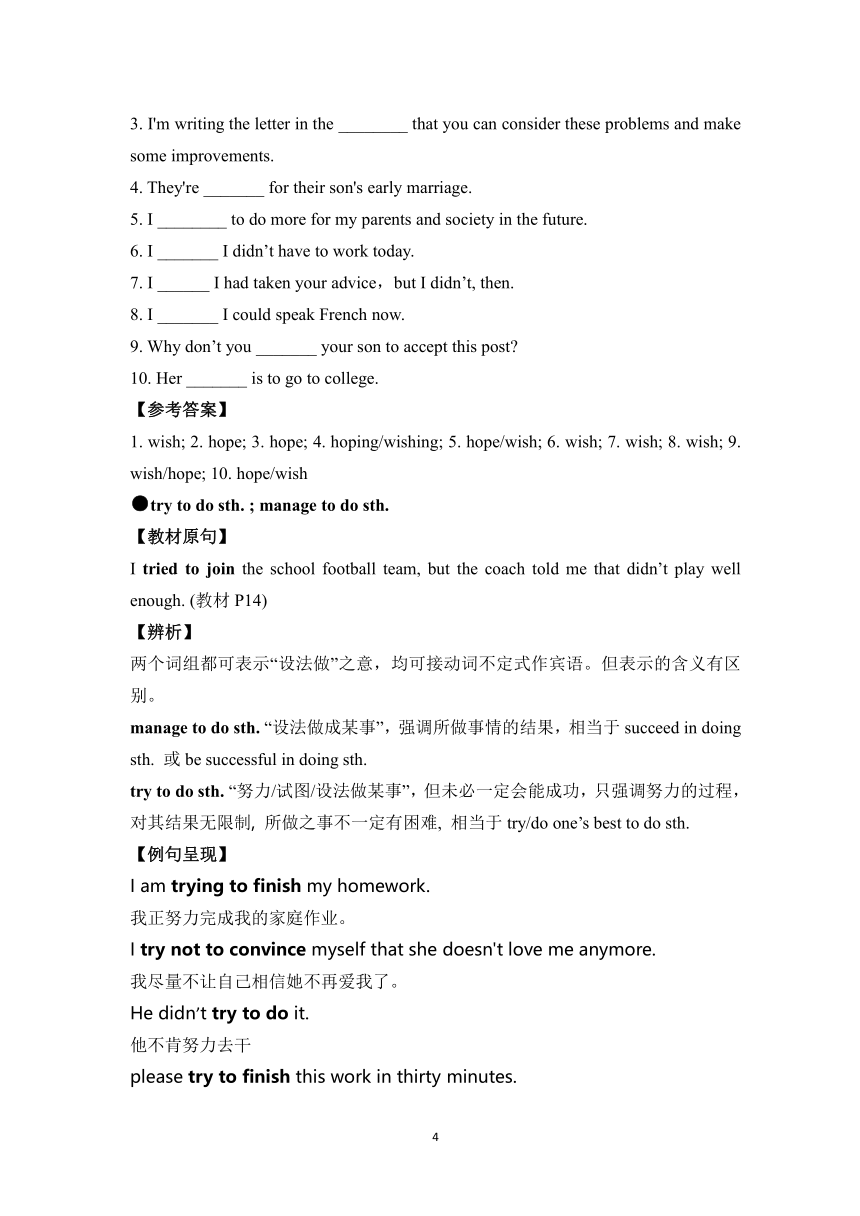
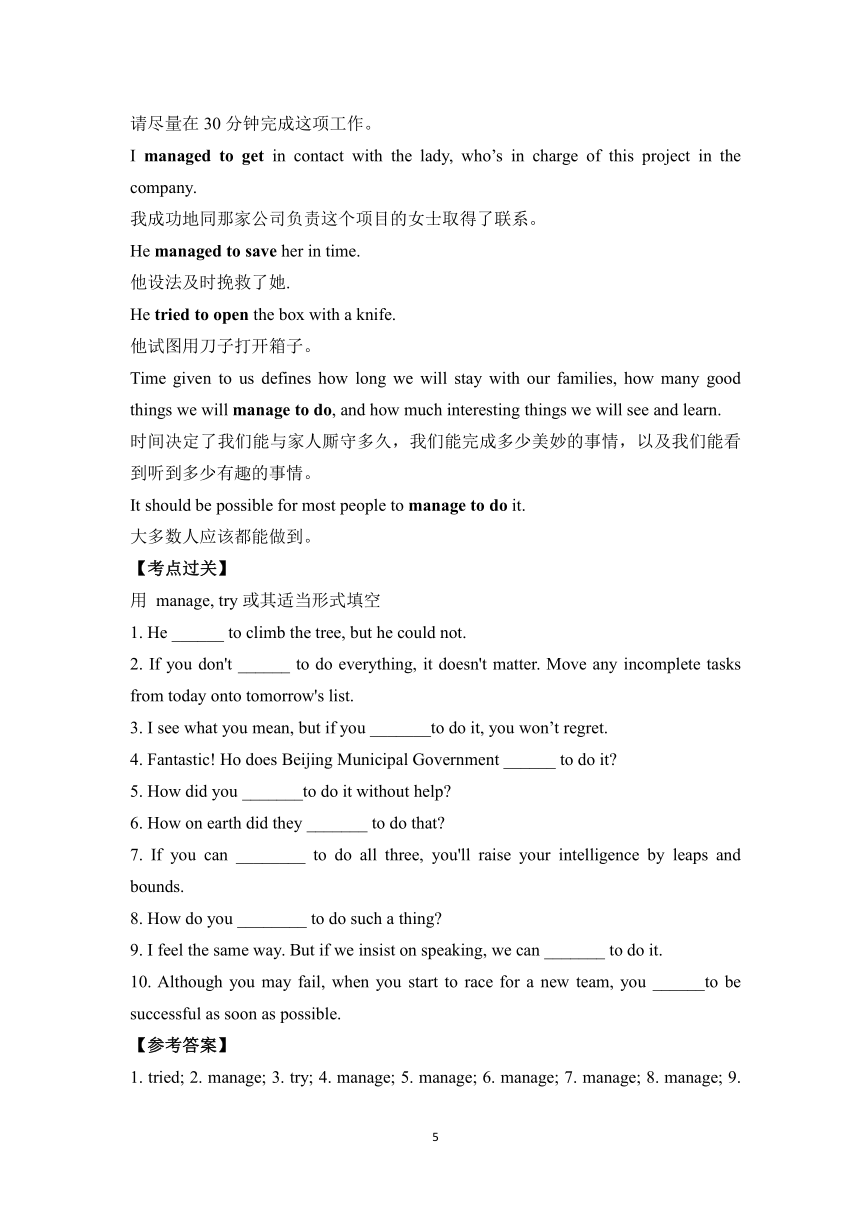
文档简介
【名师原创】:Unit1 易混易错点辨析
●confuse; puzzle
【教材原句】
The first week was a little confusing. (教材P14)
【辨析】
两者都有“困惑”的意思,此时可以换用,但其它方面有一定的区别。
confuse 表示“因为把两个或多个事物或问题混淆而使头脑糊涂混乱”, 强调混淆不清,往往暂时的情况, 造成没法清楚地思维或理智地行动。一般作及物动词, 后接名词或代词作宾语; 也可与介词with连用, 表示“把…与…弄混”。
puzzle表示“行为情况、问题或某种现象错宗复杂,使人感到困惑伤脑筋”,因而不知道该怎么解决。一般作及物动词,也可以作名词,表示“难题,字谜,疑虑,谜团”等。
【例句呈现】
Don't confuse liberty with license.
不要把自由与放纵混为一谈。
They asked me so many questions that they confused me.
他们问了我那么多的问题都把我搞迷糊了.
I often confuse you and your brother.
我常把你和你哥哥弄错了。
People are apt to confuse the two issues.
人们容易把这两个问题混淆起来。
If we confuse these three levels, we will not think clearly.
如果我们混淆了这三个等级,我们便不会清晰地思考。
My words surprised and confused/puzzled him.
我的话使他惊讶且迷惑。
What you said just now confused/puzzled me.
你刚才说的话使我很困惑。
The find left archaeologists with a puzzle.
这个发现给考古学家留下了一个谜团。
Will you help me to solve this puzzle
你能帮助我解决这个难题吗
He sat frowning over a crossword puzzle.
他坐着皱着眉头在思考纵横字谜。
She could not get the puzzle out of her mind.
她无法解开心中的疑虑。
His question puzzled me.
他的问题使我迷惑不解。
What he did puzzled me greatly.
他的作为使我深感迷惑不解。
【考点过关】
根据confuse, puzzle 意义及用法填空
1. I always confuse my left with my right.
2. Her decision was a _______ to him.
3. Don't confuse Austria with Australia.
4. I have in mind some doubts which really ________ me.
5. I've never been able to _______ her out.
6. Many business executives confuse leadership _______ action.
7. The risks can be so complex that banks hire mathematicians to _______ them out.
8. Do not confuse ever the tangential acceleration, which is along the circumference, ________ centripetal acceleration.
9. He is in a ________ about the matter.
10. She was completely _______ (confuse) by these two questions.
【参考答案】
1. with; 2. puzzle; 3. with; 4. puzzle; 5. puzzle; 6. with; 7. puzzle; 8. with; 9. puzzle; 10.confused.
●hope; wish
【教材原句】
I know that Chinese is a vey difficult language, but I hope to be fluent when I graduate. (教材P14)
【辨析】
两者都是“希望”的意思,都可作名词和动词,用法有相同的地方,但也一定的区别。
①hope和wish后面都可以接不定式,作“想; 希望”讲,不同点在于: wish后可接 “宾语+不定式” 复合结构,而hope不能。即:wish/hope to do sth. 想/希望做某事; wish sb. to do sth. 希望某人做某事
②hope和wish后面都可以接从句。接从句时,hope 表示有可能实现的愿望,而wish表示不太可能实现的愿望。wish后的从句要用虚拟语气
③wish后面可以跟双宾语,表示“祝愿”; hope没有这种用法
④hope 常构成如下机构:be beyond hope (of )没有(….的)希望; in the hope of/in hopes that /in the hope that怀着…..的希望
【例句呈现】
We all hope for happiness.
我们都希望幸福。
She wishes for his coming.
她希望他的到来。
He is the hope of his family.
他是全家人的希望。
John hopes to study law at Harvard.
约翰希望在哈佛学习法律。
I wish to find some pen-friends for my students.
我想给学生们找一些笔友。
Parents wish us to visit them at home as often as possible.
父母希 望我们常回家看看。
She hopes she can make some money.
她希望能挣些钱。(她能挣些钱的可能性是存在的) .
I wish I were as strong as you.
我要是能像你一样强壮就好了。(实际上我不像你那样强壮)
I wish you a happy new year.
祝你新年快乐!
【考点过关】
用wish 或hope的适当形式填空
1. I ________ you good luck in everything.
2. Some of the houses were beyond _______ of repair.
3. I'm writing the letter in the ________ that you can consider these problems and make some improvements.
4. They're _______ for their son's early marriage.
5. I ________ to do more for my parents and society in the future.
6. I _______ I didn’t have to work today.
7. I ______ I had taken your advice,but I didn’t, then.
8. I _______ I could speak French now.
9. Why don’t you _______ your son to accept this post
10. Her _______ is to go to college.
【参考答案】
1. wish; 2. hope; 3. hope; 4. hoping/wishing; 5. hope/wish; 6. wish; 7. wish; 8. wish; 9. wish/hope; 10. hope/wish
●try to do sth. ; manage to do sth.
【教材原句】
I tried to join the school football team, but the coach told me that didn’t play well enough. (教材P14)
【辨析】
两个词组都可表示“设法做”之意,均可接动词不定式作宾语。但表示的含义有区别。
manage to do sth. “设法做成某事”,强调所做事情的结果,相当于succeed in doing sth. 或be successful in doing sth.
try to do sth. “努力/试图/设法做某事”,但未必一定会能成功,只强调努力的过程,对其结果无限制, 所做之事不一定有困难, 相当于try/do one’s best to do sth.
【例句呈现】
I am trying to finish my homework.
我正努力完成我的家庭作业。
I try not to convince myself that she doesn't love me anymore.
我尽量不让自己相信她不再爱我了。
He didn’t try to do it.
他不肯努力去干
please try to finish this work in thirty minutes.
请尽量在30分钟完成这项工作。
I managed to get in contact with the lady, who’s in charge of this project in the company.
我成功地同那家公司负责这个项目的女士取得了联系。
He managed to save her in time.
他设法及时挽救了她.
He tried to open the box with a knife.
他试图用刀子打开箱子。
Time given to us defines how long we will stay with our families, how many good things we will manage to do, and how much interesting things we will see and learn.
时间决定了我们能与家人厮守多久,我们能完成多少美妙的事情,以及我们能看到听到多少有趣的事情。
It should be possible for most people to manage to do it.
大多数人应该都能做到。
【考点过关】
用 manage, try或其适当形式填空
1. He ______ to climb the tree, but he could not.
2. If you don't ______ to do everything, it doesn't matter. Move any incomplete tasks from today onto tomorrow's list.
3. I see what you mean, but if you _______to do it, you won’t regret.
4. Fantastic! Ho does Beijing Municipal Government ______ to do it
5. How did you _______to do it without help
6. How on earth did they _______ to do that
7. If you can ________ to do all three, you'll raise your intelligence by leaps and bounds.
8. How do you ________ to do such a thing
9. I feel the same way. But if we insist on speaking, we can _______ to do it.
10. Although you may fail, when you start to race for a new team, you ______to be successful as soon as possible.
【参考答案】
1. tried; 2. manage; 3. try; 4. manage; 5. manage; 6. manage; 7. manage; 8. manage; 9. manage; 10. try
●主语 + used to do; 主语 + be/get used to doing sth.; 主语 + be used to do sth.
【教材原句】
I know I’ll have to study harder as a senior high school student and get used to being responsible for a lot more. (教材P14)
I’m a bit worried about keeping up with the other students in my advanced course, and it’ll be quite difficult to get used to all the homework. (教材P14)
【辨析】
主语 + used to do sth. 表示“过去常常”,说明过去经常发生的动作或存在的状态,但现在已经不那样做或已经不存在了。其中的to是不定式符号,后面要接动词原形。它只有过去式一种形式,可以用于所有人称。
主语 + be/get used to sth./doing sth. 表示“习惯于做某事”,to是介词,后面接名词、代词或动名词,be是系动词,可以用于过去、现在、将来的多种时态, 还可以用get, become等词来代替。
主语 + be used to do sth. =主语 + be used for doing sth. 表示“被用来做某事”,是use sth. to do sth. 和use sth. for doing sth.的被动结构。
温馨提示:
①used to do sth. 的疑问式为Did … use to … 或Used … to … 构成;否定式为didn’t use to do sth. 或 usedn’t to do sth.
② there used to be… 表示“过去有….”
【例句呈现】
This powerful drug is used to tranquilize patients undergoing surgery.
这种强效药剂被用来麻醉手术病人。
The test is used to diagnose a variety of diseases.
此项化验可用于诊断多种疾病。
They used to buy ten kilos of beef in one lump.
他们过去常买10公斤重的整块牛肉。
The old-timers used to recall how hot 1886 was.
老人们常常回想起1886年的酷热。
I used to watch TV, but now I don’t like it.
我过去常常看电视,但现在不喜欢了。
He didn’t use / used not to go home by bus.
他过去不常坐公共汽车回家。
-- Did you use to be a teacher / Used you to be a teacher 你过去是老师吗
-- Yes, I did. 是的。
There used to be an old temple behind my house, didn’t there
过去我家房子后面有一个古寺,是吗?
He is used to air travel.
他习惯坐飞机旅行。
She is not used to eating Chinese food.
她不习惯吃中餐。
You’ll soon be/get/become used to our way of living.
你不久就会习惯我们的生活方式的。
Wood is often used to make desks and chairs.
木材常常被用来制作桌椅。
Coal can be used to keep warm.
煤可以用来取暖。
I am used to getting up early.
我习惯早起。
【考点过关】
根据“主语 + used to do; 主语 + be/get used to doing sth.; 主语 + be used to do sth. ”用法填空
1. My cousin is used to ________ (study) with his new friends in Australia.
2. I never used to ___________ (eat) cakes, but I eat a lot now.
3. My mother is used to ________ (get) up early to cook breakfast for us.
4. I used to ___________ (go) swimming on Saturdays.
5. Jim has lived in Australia for two years. He is used to _________ (drive) on the left.
6. Didn’t she use to ____________ (live) in Germany
7. You’ll soon get used to ___________ (live) in the country.
8. I’m not used to _____________ (treat) like this.
9. My parents used to ________ (get) up at 7, but now they get up at 6 and cook breakfast for me.
10. Knives are used for _________ (cut) things.
【参考答案】
1. studying; 2. eat; 3. getting; 4. go; 5. driving; 6. live; 7. living; 8. being treated; 9. get; 10. cutting
●debate; argue; discuss; quarrel
【教材原句】
Linda thinks and speaks quite quickly, and she can do well in the debate. (教材P16)
【辨析】
四个词都有 “辩论,争论,说理”之意。但各有侧重。
debate 往往侧重指意见等对立的双方之间正式或公开的争辩, 既可以作名词也可以作动词。
argue 表示提出理由或证据为自己或自己一方的看法或立场辩护,着重说理、论证和企图说服。
discuss 表示就某一或某些问题表明观点、看法等,以便统一认识,解决问题,最常用词。
quarrel 表示两人之间或两个团体之间不友好的、大声争论某事,重点是“吵嘴、吵架”, 既可以作名词也可以作动词。
【例句呈现】
His comments are bound to add fuel to the debate.
他的话必将为争论推波助澜。
A full-scale debate is under way on what ails the industry.
关于工业为何陷入困境正在展开一场全面的讨论。
The senator argued with the President about the new tax bill.
参议员和新总统为新税法案争辩了。
One could argue that smoking, by its very nature, is addictive.
有人可能认为抽烟从本质上说就具有成瘾性。
They argue that only private capitalists can remake Poland's economy.
他们认为,只有私人资本家才能重振波兰经济。
The Politburo has been meeting in Peking to discuss the situation.
政治局已在北京召开会议讨论形势。
Senior politicians met today to discuss the future of European economic unity.
高级政要今天会晤,探讨欧洲经济一体化的未来。
The magazine's aim is to discuss topical issues within a Christian framework.
该杂志的宗旨是在基督教框架下讨论时下的热门话题。
They could quarrel quite legitimately with some of my choices.
他们大有理由不同意我的一些选择。
The monarchists are a small fringe group who quarrel fiercely among themselves.
君主主义者是一个内部争吵激烈的非主流的小团体。
【考点过关】
翻译下列句子
1. 这个医生论述了治疗癌症的不同方法。
2. 针对他是否能胜任最高职务展开了争论。
3. 这件事可能是在他们为娜奥米争吵的过程中发生的。
4. 有一些人认为真正独立的意见是不存在的。
【参考答案】
1. The doctor discussed different approaches to the treatment of cancer.
2. There is a debate about/over his fitness for the highest office.
3. It could have happened during a quarrel between them about/over Naomi.
4. There are those who argue that true independent advice is unattainable.
●why not do sth. ; why do sth.
【教材原句】
For Tim, that dream has come true! (教材P18)
【辨析】
两者后面都接动词原形,但意义不同。
Why not do sth. 意思是“为什么不......呢 ”,常表示建议或劝说。是why don’t you do sth. 的省略形式。
Why do sth. 意思是“为什么要….呢?”,常表示反对和不同意做某事, 也有埋怨、不满、责备等感彩。
【例句呈现】
Why not ask someone else Perhaps someone knows the way.
为什么不问问别人呢 或许别人知道路线。
Why not go there at once If you are not in a hurry, you will be late.
为什么不马上去呢 你要是不赶紧的话,会迟到的。
Now that your girl-friend is in a bad mood, why not give her some flowers
既然你女朋友情绪不好,为什么不送她一些花呢
She has got angry, you know, why argue with her about doing homework
你看,她已经生气了,为啥还要和她就作业问题辩论呢?
Your family is very poor, and why spend so much money in playing computer games
你家条件那么差,为啥还要花那么多钱打电脑游戏呢?
Why go there at night It is dangerous.
为啥晚上去那里,很危险的。
Why hurt your mother Please tell me.
为啥伤害你母亲,告诉我?
Why turn to him for help Don’t you know he is badly ill
为什么要求助于他?难道你不知道他病得很严重吗?
【考点过关】
翻译下列句子
1. 既然你喜欢写些文章,为什么不找个笔友呢?
2. 失败是成功之母,为啥不再试一次呢?
3. 你看,天快黑了,为什么不马上走呢
4. 为什么不做个西红柿实验呢
5. 如果你需要钱的话,为啥不卖掉这辆旧车呢?
6. 为什么要打孩子?别忘了,他才十二岁。
【参考答案】
1. Now that you like writing, why not find a pen friend
2. Failure is the mother of success. Why not try again?
3. You see, it is getting darker and darker. Why not go at once
4. Why not do a tomato experiment
5. If you need some money, why not sell the old car?
6. Why beat your child After all, he is only 12 years old.
●句型have some problems/difficulty/trouble (in) doing sth.和句型have some problems/difficulty/trouble with sth.
【教材原句】
What problems did you or your friends have with this unit (教材P20)
【辨析】
两者意思相近,但用法有区别。
sb. have some difficulty/trouble/problems (in) doing sth. 意思是“某人在做某事方面有困难/麻烦/问题”,这里的介词in可有可无。
have some difficulty/trouble/problems with sth. 意思是“某人在做某事方面有困难/麻烦/问题”,这里使用介词with,后面接名词。
温馨提示:
①两个句型中,difficulty, trouble 必须用单数,problem用复数。
②两个句型中的some可根据句意换成little, no, much等。
【例句呈现】
I have some difficulty in understanding my English teacher in class.
我课堂上听不懂英语老师的讲解。
I have some difficulty in pronouncing some of the words in English.
我发某些单词的音有些困难。
90.8% of glaucoma patients have some difficulty in sleeping. 93.1% of cases have shallow sleeping.
90.8%青光眼病人存在入睡困难,93.1%病人睡眠不深。
But during the daily teaching, teachers have some difficulty in teaching and so do students in learning, which makes teaching and learning more difficult.
但在实际教学中,却也出现了不少问题,使得部分教师教学和学生学习存在困难。
I have some difficulty in dealing with the abstract-let's get down to some particulars.
我考虑抽象概念有些困难,让我们处理一些具体事情吧。
One person may have no difficulty with language development.
有的人可能有语言开发的困难。
Most of the girls have much difficulty with their families.
所以绝大多数的女孩都会与家庭关系紧张。
You may have some difficulty with this book at first, but you'll find it much easier as you go along.
开始时你或许会觉得这本书难读,但过些时候你便会觉得容易得多。
I have some trouble with the carburetor. The salesman fobbed the lady off with a faulty machine.
推销员把一部有毛病的机器冒充正品卖给了那位女士。
I have some trouble in reading her handwriting.
我认她的笔迹有些困难。
We have some trouble in spelling.
我们在拼写方面有困难。
He has some problems with his work in Canada, I'm afraid.
恐怕他在加拿大那边的事出问题啦。
Thelma& Louise Louise is working in a diner as a waitress and has some problems with her boyfriend Jimmy, who, as a musician, is always on the road.
路易丝是咖啡馆的服务生,她的男朋友杰米是个搞音乐的,经常在外演出,两人有点矛盾。
Levant thinks that Steinbeck has some problems in grasping the structure and materials.
这位评论家认为斯坦贝克在掌握结构与素材上仍有不足。
【考点过关】
请根据句型have some difficulty/trouble/problems (in) doing sth.和句型have some difficulty/trouble/problems with sth.的用法填空
1. He is likely to have some trouble _______ it, but he shouldn't be completely in the dark about it.
2. As I have some trouble _______ my leg, I can't move around easily, nor can I sit too long.
3. I have some difficulty in _______ (answer) the question.
4. His business has faced difficulty _______ debt.
5. I have some trouble in _______ (pronounce) this sound.
6. She has no difficulty _______ Italian.
7. He has some difficulty in ________ (give) shape to his ideas.
8. She has difficulty ________ English pronunciation.
9. He has some trouble _______ (work) out the problem, I think.
10. He has difficulty _________ (adjust) to group living.
11. He has some problems ________ the language.
12. Children with autism have difficulty ______ social skills and communication.
13. He has difficulty in ________ (identify) with the cause of the disease.
14. He has some problems ________ his teeth.
15. You shouldn't have much difficulty _______ your personal data files.
16. She has difficulty ________ (learn) English, however, she works hard and is making rapid progress.
17. I have difficulty communicating _______ a stubborn man like him.
18. This article has discussed some problems in _______ (adjust) to the new requirements.
【参考答案】
1. with; 2. with; 3. answering; 4. with; 5. pronouncing; 6. with; 7. giving; 8. with; 9. working; 10. adjusting; 11. with; 12. with; 13. identifying; 14. with; 15. with; 16. learning; 17. with; 18. adjusting
10
●confuse; puzzle
【教材原句】
The first week was a little confusing. (教材P14)
【辨析】
两者都有“困惑”的意思,此时可以换用,但其它方面有一定的区别。
confuse 表示“因为把两个或多个事物或问题混淆而使头脑糊涂混乱”, 强调混淆不清,往往暂时的情况, 造成没法清楚地思维或理智地行动。一般作及物动词, 后接名词或代词作宾语; 也可与介词with连用, 表示“把…与…弄混”。
puzzle表示“行为情况、问题或某种现象错宗复杂,使人感到困惑伤脑筋”,因而不知道该怎么解决。一般作及物动词,也可以作名词,表示“难题,字谜,疑虑,谜团”等。
【例句呈现】
Don't confuse liberty with license.
不要把自由与放纵混为一谈。
They asked me so many questions that they confused me.
他们问了我那么多的问题都把我搞迷糊了.
I often confuse you and your brother.
我常把你和你哥哥弄错了。
People are apt to confuse the two issues.
人们容易把这两个问题混淆起来。
If we confuse these three levels, we will not think clearly.
如果我们混淆了这三个等级,我们便不会清晰地思考。
My words surprised and confused/puzzled him.
我的话使他惊讶且迷惑。
What you said just now confused/puzzled me.
你刚才说的话使我很困惑。
The find left archaeologists with a puzzle.
这个发现给考古学家留下了一个谜团。
Will you help me to solve this puzzle
你能帮助我解决这个难题吗
He sat frowning over a crossword puzzle.
他坐着皱着眉头在思考纵横字谜。
She could not get the puzzle out of her mind.
她无法解开心中的疑虑。
His question puzzled me.
他的问题使我迷惑不解。
What he did puzzled me greatly.
他的作为使我深感迷惑不解。
【考点过关】
根据confuse, puzzle 意义及用法填空
1. I always confuse my left with my right.
2. Her decision was a _______ to him.
3. Don't confuse Austria with Australia.
4. I have in mind some doubts which really ________ me.
5. I've never been able to _______ her out.
6. Many business executives confuse leadership _______ action.
7. The risks can be so complex that banks hire mathematicians to _______ them out.
8. Do not confuse ever the tangential acceleration, which is along the circumference, ________ centripetal acceleration.
9. He is in a ________ about the matter.
10. She was completely _______ (confuse) by these two questions.
【参考答案】
1. with; 2. puzzle; 3. with; 4. puzzle; 5. puzzle; 6. with; 7. puzzle; 8. with; 9. puzzle; 10.confused.
●hope; wish
【教材原句】
I know that Chinese is a vey difficult language, but I hope to be fluent when I graduate. (教材P14)
【辨析】
两者都是“希望”的意思,都可作名词和动词,用法有相同的地方,但也一定的区别。
①hope和wish后面都可以接不定式,作“想; 希望”讲,不同点在于: wish后可接 “宾语+不定式” 复合结构,而hope不能。即:wish/hope to do sth. 想/希望做某事; wish sb. to do sth. 希望某人做某事
②hope和wish后面都可以接从句。接从句时,hope 表示有可能实现的愿望,而wish表示不太可能实现的愿望。wish后的从句要用虚拟语气
③wish后面可以跟双宾语,表示“祝愿”; hope没有这种用法
④hope 常构成如下机构:be beyond hope (of )没有(….的)希望; in the hope of/in hopes that /in the hope that怀着…..的希望
【例句呈现】
We all hope for happiness.
我们都希望幸福。
She wishes for his coming.
她希望他的到来。
He is the hope of his family.
他是全家人的希望。
John hopes to study law at Harvard.
约翰希望在哈佛学习法律。
I wish to find some pen-friends for my students.
我想给学生们找一些笔友。
Parents wish us to visit them at home as often as possible.
父母希 望我们常回家看看。
She hopes she can make some money.
她希望能挣些钱。(她能挣些钱的可能性是存在的) .
I wish I were as strong as you.
我要是能像你一样强壮就好了。(实际上我不像你那样强壮)
I wish you a happy new year.
祝你新年快乐!
【考点过关】
用wish 或hope的适当形式填空
1. I ________ you good luck in everything.
2. Some of the houses were beyond _______ of repair.
3. I'm writing the letter in the ________ that you can consider these problems and make some improvements.
4. They're _______ for their son's early marriage.
5. I ________ to do more for my parents and society in the future.
6. I _______ I didn’t have to work today.
7. I ______ I had taken your advice,but I didn’t, then.
8. I _______ I could speak French now.
9. Why don’t you _______ your son to accept this post
10. Her _______ is to go to college.
【参考答案】
1. wish; 2. hope; 3. hope; 4. hoping/wishing; 5. hope/wish; 6. wish; 7. wish; 8. wish; 9. wish/hope; 10. hope/wish
●try to do sth. ; manage to do sth.
【教材原句】
I tried to join the school football team, but the coach told me that didn’t play well enough. (教材P14)
【辨析】
两个词组都可表示“设法做”之意,均可接动词不定式作宾语。但表示的含义有区别。
manage to do sth. “设法做成某事”,强调所做事情的结果,相当于succeed in doing sth. 或be successful in doing sth.
try to do sth. “努力/试图/设法做某事”,但未必一定会能成功,只强调努力的过程,对其结果无限制, 所做之事不一定有困难, 相当于try/do one’s best to do sth.
【例句呈现】
I am trying to finish my homework.
我正努力完成我的家庭作业。
I try not to convince myself that she doesn't love me anymore.
我尽量不让自己相信她不再爱我了。
He didn’t try to do it.
他不肯努力去干
please try to finish this work in thirty minutes.
请尽量在30分钟完成这项工作。
I managed to get in contact with the lady, who’s in charge of this project in the company.
我成功地同那家公司负责这个项目的女士取得了联系。
He managed to save her in time.
他设法及时挽救了她.
He tried to open the box with a knife.
他试图用刀子打开箱子。
Time given to us defines how long we will stay with our families, how many good things we will manage to do, and how much interesting things we will see and learn.
时间决定了我们能与家人厮守多久,我们能完成多少美妙的事情,以及我们能看到听到多少有趣的事情。
It should be possible for most people to manage to do it.
大多数人应该都能做到。
【考点过关】
用 manage, try或其适当形式填空
1. He ______ to climb the tree, but he could not.
2. If you don't ______ to do everything, it doesn't matter. Move any incomplete tasks from today onto tomorrow's list.
3. I see what you mean, but if you _______to do it, you won’t regret.
4. Fantastic! Ho does Beijing Municipal Government ______ to do it
5. How did you _______to do it without help
6. How on earth did they _______ to do that
7. If you can ________ to do all three, you'll raise your intelligence by leaps and bounds.
8. How do you ________ to do such a thing
9. I feel the same way. But if we insist on speaking, we can _______ to do it.
10. Although you may fail, when you start to race for a new team, you ______to be successful as soon as possible.
【参考答案】
1. tried; 2. manage; 3. try; 4. manage; 5. manage; 6. manage; 7. manage; 8. manage; 9. manage; 10. try
●主语 + used to do; 主语 + be/get used to doing sth.; 主语 + be used to do sth.
【教材原句】
I know I’ll have to study harder as a senior high school student and get used to being responsible for a lot more. (教材P14)
I’m a bit worried about keeping up with the other students in my advanced course, and it’ll be quite difficult to get used to all the homework. (教材P14)
【辨析】
主语 + used to do sth. 表示“过去常常”,说明过去经常发生的动作或存在的状态,但现在已经不那样做或已经不存在了。其中的to是不定式符号,后面要接动词原形。它只有过去式一种形式,可以用于所有人称。
主语 + be/get used to sth./doing sth. 表示“习惯于做某事”,to是介词,后面接名词、代词或动名词,be是系动词,可以用于过去、现在、将来的多种时态, 还可以用get, become等词来代替。
主语 + be used to do sth. =主语 + be used for doing sth. 表示“被用来做某事”,是use sth. to do sth. 和use sth. for doing sth.的被动结构。
温馨提示:
①used to do sth. 的疑问式为Did … use to … 或Used … to … 构成;否定式为didn’t use to do sth. 或 usedn’t to do sth.
② there used to be… 表示“过去有….”
【例句呈现】
This powerful drug is used to tranquilize patients undergoing surgery.
这种强效药剂被用来麻醉手术病人。
The test is used to diagnose a variety of diseases.
此项化验可用于诊断多种疾病。
They used to buy ten kilos of beef in one lump.
他们过去常买10公斤重的整块牛肉。
The old-timers used to recall how hot 1886 was.
老人们常常回想起1886年的酷热。
I used to watch TV, but now I don’t like it.
我过去常常看电视,但现在不喜欢了。
He didn’t use / used not to go home by bus.
他过去不常坐公共汽车回家。
-- Did you use to be a teacher / Used you to be a teacher 你过去是老师吗
-- Yes, I did. 是的。
There used to be an old temple behind my house, didn’t there
过去我家房子后面有一个古寺,是吗?
He is used to air travel.
他习惯坐飞机旅行。
She is not used to eating Chinese food.
她不习惯吃中餐。
You’ll soon be/get/become used to our way of living.
你不久就会习惯我们的生活方式的。
Wood is often used to make desks and chairs.
木材常常被用来制作桌椅。
Coal can be used to keep warm.
煤可以用来取暖。
I am used to getting up early.
我习惯早起。
【考点过关】
根据“主语 + used to do; 主语 + be/get used to doing sth.; 主语 + be used to do sth. ”用法填空
1. My cousin is used to ________ (study) with his new friends in Australia.
2. I never used to ___________ (eat) cakes, but I eat a lot now.
3. My mother is used to ________ (get) up early to cook breakfast for us.
4. I used to ___________ (go) swimming on Saturdays.
5. Jim has lived in Australia for two years. He is used to _________ (drive) on the left.
6. Didn’t she use to ____________ (live) in Germany
7. You’ll soon get used to ___________ (live) in the country.
8. I’m not used to _____________ (treat) like this.
9. My parents used to ________ (get) up at 7, but now they get up at 6 and cook breakfast for me.
10. Knives are used for _________ (cut) things.
【参考答案】
1. studying; 2. eat; 3. getting; 4. go; 5. driving; 6. live; 7. living; 8. being treated; 9. get; 10. cutting
●debate; argue; discuss; quarrel
【教材原句】
Linda thinks and speaks quite quickly, and she can do well in the debate. (教材P16)
【辨析】
四个词都有 “辩论,争论,说理”之意。但各有侧重。
debate 往往侧重指意见等对立的双方之间正式或公开的争辩, 既可以作名词也可以作动词。
argue 表示提出理由或证据为自己或自己一方的看法或立场辩护,着重说理、论证和企图说服。
discuss 表示就某一或某些问题表明观点、看法等,以便统一认识,解决问题,最常用词。
quarrel 表示两人之间或两个团体之间不友好的、大声争论某事,重点是“吵嘴、吵架”, 既可以作名词也可以作动词。
【例句呈现】
His comments are bound to add fuel to the debate.
他的话必将为争论推波助澜。
A full-scale debate is under way on what ails the industry.
关于工业为何陷入困境正在展开一场全面的讨论。
The senator argued with the President about the new tax bill.
参议员和新总统为新税法案争辩了。
One could argue that smoking, by its very nature, is addictive.
有人可能认为抽烟从本质上说就具有成瘾性。
They argue that only private capitalists can remake Poland's economy.
他们认为,只有私人资本家才能重振波兰经济。
The Politburo has been meeting in Peking to discuss the situation.
政治局已在北京召开会议讨论形势。
Senior politicians met today to discuss the future of European economic unity.
高级政要今天会晤,探讨欧洲经济一体化的未来。
The magazine's aim is to discuss topical issues within a Christian framework.
该杂志的宗旨是在基督教框架下讨论时下的热门话题。
They could quarrel quite legitimately with some of my choices.
他们大有理由不同意我的一些选择。
The monarchists are a small fringe group who quarrel fiercely among themselves.
君主主义者是一个内部争吵激烈的非主流的小团体。
【考点过关】
翻译下列句子
1. 这个医生论述了治疗癌症的不同方法。
2. 针对他是否能胜任最高职务展开了争论。
3. 这件事可能是在他们为娜奥米争吵的过程中发生的。
4. 有一些人认为真正独立的意见是不存在的。
【参考答案】
1. The doctor discussed different approaches to the treatment of cancer.
2. There is a debate about/over his fitness for the highest office.
3. It could have happened during a quarrel between them about/over Naomi.
4. There are those who argue that true independent advice is unattainable.
●why not do sth. ; why do sth.
【教材原句】
For Tim, that dream has come true! (教材P18)
【辨析】
两者后面都接动词原形,但意义不同。
Why not do sth. 意思是“为什么不......呢 ”,常表示建议或劝说。是why don’t you do sth. 的省略形式。
Why do sth. 意思是“为什么要….呢?”,常表示反对和不同意做某事, 也有埋怨、不满、责备等感彩。
【例句呈现】
Why not ask someone else Perhaps someone knows the way.
为什么不问问别人呢 或许别人知道路线。
Why not go there at once If you are not in a hurry, you will be late.
为什么不马上去呢 你要是不赶紧的话,会迟到的。
Now that your girl-friend is in a bad mood, why not give her some flowers
既然你女朋友情绪不好,为什么不送她一些花呢
She has got angry, you know, why argue with her about doing homework
你看,她已经生气了,为啥还要和她就作业问题辩论呢?
Your family is very poor, and why spend so much money in playing computer games
你家条件那么差,为啥还要花那么多钱打电脑游戏呢?
Why go there at night It is dangerous.
为啥晚上去那里,很危险的。
Why hurt your mother Please tell me.
为啥伤害你母亲,告诉我?
Why turn to him for help Don’t you know he is badly ill
为什么要求助于他?难道你不知道他病得很严重吗?
【考点过关】
翻译下列句子
1. 既然你喜欢写些文章,为什么不找个笔友呢?
2. 失败是成功之母,为啥不再试一次呢?
3. 你看,天快黑了,为什么不马上走呢
4. 为什么不做个西红柿实验呢
5. 如果你需要钱的话,为啥不卖掉这辆旧车呢?
6. 为什么要打孩子?别忘了,他才十二岁。
【参考答案】
1. Now that you like writing, why not find a pen friend
2. Failure is the mother of success. Why not try again?
3. You see, it is getting darker and darker. Why not go at once
4. Why not do a tomato experiment
5. If you need some money, why not sell the old car?
6. Why beat your child After all, he is only 12 years old.
●句型have some problems/difficulty/trouble (in) doing sth.和句型have some problems/difficulty/trouble with sth.
【教材原句】
What problems did you or your friends have with this unit (教材P20)
【辨析】
两者意思相近,但用法有区别。
sb. have some difficulty/trouble/problems (in) doing sth. 意思是“某人在做某事方面有困难/麻烦/问题”,这里的介词in可有可无。
have some difficulty/trouble/problems with sth. 意思是“某人在做某事方面有困难/麻烦/问题”,这里使用介词with,后面接名词。
温馨提示:
①两个句型中,difficulty, trouble 必须用单数,problem用复数。
②两个句型中的some可根据句意换成little, no, much等。
【例句呈现】
I have some difficulty in understanding my English teacher in class.
我课堂上听不懂英语老师的讲解。
I have some difficulty in pronouncing some of the words in English.
我发某些单词的音有些困难。
90.8% of glaucoma patients have some difficulty in sleeping. 93.1% of cases have shallow sleeping.
90.8%青光眼病人存在入睡困难,93.1%病人睡眠不深。
But during the daily teaching, teachers have some difficulty in teaching and so do students in learning, which makes teaching and learning more difficult.
但在实际教学中,却也出现了不少问题,使得部分教师教学和学生学习存在困难。
I have some difficulty in dealing with the abstract-let's get down to some particulars.
我考虑抽象概念有些困难,让我们处理一些具体事情吧。
One person may have no difficulty with language development.
有的人可能有语言开发的困难。
Most of the girls have much difficulty with their families.
所以绝大多数的女孩都会与家庭关系紧张。
You may have some difficulty with this book at first, but you'll find it much easier as you go along.
开始时你或许会觉得这本书难读,但过些时候你便会觉得容易得多。
I have some trouble with the carburetor. The salesman fobbed the lady off with a faulty machine.
推销员把一部有毛病的机器冒充正品卖给了那位女士。
I have some trouble in reading her handwriting.
我认她的笔迹有些困难。
We have some trouble in spelling.
我们在拼写方面有困难。
He has some problems with his work in Canada, I'm afraid.
恐怕他在加拿大那边的事出问题啦。
Thelma& Louise Louise is working in a diner as a waitress and has some problems with her boyfriend Jimmy, who, as a musician, is always on the road.
路易丝是咖啡馆的服务生,她的男朋友杰米是个搞音乐的,经常在外演出,两人有点矛盾。
Levant thinks that Steinbeck has some problems in grasping the structure and materials.
这位评论家认为斯坦贝克在掌握结构与素材上仍有不足。
【考点过关】
请根据句型have some difficulty/trouble/problems (in) doing sth.和句型have some difficulty/trouble/problems with sth.的用法填空
1. He is likely to have some trouble _______ it, but he shouldn't be completely in the dark about it.
2. As I have some trouble _______ my leg, I can't move around easily, nor can I sit too long.
3. I have some difficulty in _______ (answer) the question.
4. His business has faced difficulty _______ debt.
5. I have some trouble in _______ (pronounce) this sound.
6. She has no difficulty _______ Italian.
7. He has some difficulty in ________ (give) shape to his ideas.
8. She has difficulty ________ English pronunciation.
9. He has some trouble _______ (work) out the problem, I think.
10. He has difficulty _________ (adjust) to group living.
11. He has some problems ________ the language.
12. Children with autism have difficulty ______ social skills and communication.
13. He has difficulty in ________ (identify) with the cause of the disease.
14. He has some problems ________ his teeth.
15. You shouldn't have much difficulty _______ your personal data files.
16. She has difficulty ________ (learn) English, however, she works hard and is making rapid progress.
17. I have difficulty communicating _______ a stubborn man like him.
18. This article has discussed some problems in _______ (adjust) to the new requirements.
【参考答案】
1. with; 2. with; 3. answering; 4. with; 5. pronouncing; 6. with; 7. giving; 8. with; 9. working; 10. adjusting; 11. with; 12. with; 13. identifying; 14. with; 15. with; 16. learning; 17. with; 18. adjusting
10
